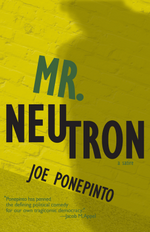 Mr. Neutron
Mr. Neutron
by Joe Ponepinto
eARC, 300 pg.
7.13 Books, 2018
Read: March 1 – 3, 2018

It couldn’t be real. Just couldn’t. Besides, if someone brought a cadaver to life today, it would be under controlled circumstances—in a lab at some university, with the media and religious protesters in attendance. It would go viral on the web. He would have heard about it.
Still, Gray couldn’t dismiss the possibility. His timid psyche often cleaved to the supernatural, if only to explain the failures in his life. And dead men had been elected before, although they typically stayed in their graves and didn’t campaign.
Before I get into this — yes, this is a political satire. But it’s pretty apolitical. There are almost no political points made, few actual policies advanced or discussed, and certainly no mainstream parties are either pilloried or lauded. The satire is of this strange thing called American politics — the campaigns, the process, the press, the people involved. Conservatives, liberals, statists, libertarians, and everyone in between can read this safely without worrying about getting much tweaked by the book.
In the opening paragraphs we meet Gray (Davenport, we’re later told) and Reason Wilder. Gray is running a mayoral campaign and one of his candidate’s opponents is Reason. Right away, you can tell this book isn’t going for subtlety. We later meet Patsy Flatley (the advisor to Gray’s candidate), The Reverend Inchoate Hand, Breeze Wellington, and Randy (of various last names) — all of these names tell you a good deal about these characters (and I could’ve listed other examples). Ponepinto lays his cards on the table right away when it comes to his characters and the type of people they are.
Reason isn’t the best funded, most articulate, or most polished candidate — but there’s some impossibly strong magnetism about him and his simple promise that “Together we will do great things for this city,” without ever giving a specific idea how they’ll do that, or what a great thing might be. Virtually everyone who encounters Reason falls under his spell but Gray. Not only does Gray maintain some sort of skepticism about Reason, he notices a disturbing odor about him, the way his body doesn’t seem to work together organically, and frankly, doesn’t seem to belong together. It’s almost as if someone stitched him together from spare parts.
Once Gray starts speculating down that path, he becomes convinced that’s the case — and sets out to prove it. Along the way, this effort causes problems in his marriage (well, it brings problems in his marriage to a head); brings some powerful people into his life; and puts him in league with the strangest journalists you’ve probably encountered. This kicks off some overdue self-examination to go along with his hunt for information about Reason.
All the while, the campaign goes on: Gray’s duller than dull candidate tries to build a voter base, the well-funded front-runner has to work to remain relevant, and Reason’s cult grows in a way no one can believe (or deny). We see a debate, a fundraiser or two, press conferences, polls, and money — and the ways all of those can alter a campaign, especially the money.
One difficulty I had while reading this book was remembering it was a satire — Ponepinto’s writing frequently comes across as highly-crafted and nuanced, and then he’ll have someone named Randy do something filled with innuendo or something equally obvious or ridiculous and I’d have to remind myself I was reading a book about a Frankenstein’s Monster-like being running for mayor, and perhaps I shouldn’t take it too seriously. I do think that’s a strength of the book — I’d forget I was reading nonsense about impossible tings because the narration was just so serious. It is a funny book, at times, but not told in a way that underscores it, which somehow works.
I didn’t love the ending, honestly. But I absolutely get why Ponepinto did it — and good satires rarely have satisfactory endings anyway. This was better than a lot of them — for example, I’ve read almost all of Christopher Buckley’s novels and there’s only one of them that had an ending I can tolerate. So, “didn’t love” is pretty good. I thought the last couple of paragraphs were far too preachy, and could’ve been cut without really harming the novel and/or its message.
But before all that, we’ve got a very strange ride. You’re not going to see a lot like this — a little supernatural/monster, some pointed commentary on politics, a dash of romance, a nice friendship, and an odd collection of characters bringing all this to you. You should give it a shot. I have no idea what kind of follow-up Ponepinto might have in store, but I’m very curious.
Disclaimer: I received this eARC in exchange for this post and my honest opinions.
—–


